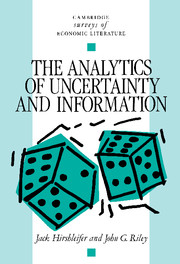Book contents
- Frontmatter
- Contents
- Acknowledgments
- Introduction: The economics of uncertainty and information
- Part I
- Part II
- 5 Information and informational decisions
- 6 The economics of emergent public information
- 7 Research and invention
- 8 Informational asymmetry and contract design
- 9 Strategic uncertainty and equilibrium concepts
- 10 The economics of contests
- 11 Competition and hidden knowledge
- 12 Long-run relationships and the credibility of threats and promises
- Index
11 - Competition and hidden knowledge
Published online by Cambridge University Press: 05 June 2012
- Frontmatter
- Contents
- Acknowledgments
- Introduction: The economics of uncertainty and information
- Part I
- Part II
- 5 Information and informational decisions
- 6 The economics of emergent public information
- 7 Research and invention
- 8 Informational asymmetry and contract design
- 9 Strategic uncertainty and equilibrium concepts
- 10 The economics of contests
- 11 Competition and hidden knowledge
- 12 Long-run relationships and the credibility of threats and promises
- Index
Summary
In preceding chapters we modeled situations with a large number of informed individuals on one side of the market, for example, potential purchasers of insurance who are aware of their individual likelihoods of suffering loss, or potential bidders in an auction aware of their own reservation prices. On the other side of the market we assumed a relatively uninformed trader possessing some degree of monopoly power-the insurance company, or the seller at auction. The main issue addressed was contract design: a schedule of options whereby the monopolist might induce the different types of traders on the other side of the market to reveal themselves. An insurance deductible option will tend to separate the better from poorer risks, and any auction structure will similarly tend to separate the more desirous from the less desirous purchasers.
This chapter relaxes the assumption that the uninformed transactor has no close competitors. Instead, in each market a number of decision-makers compete with one another in the design of contracts intended to separate the different types of trading partners they might be dealing with.
In section 11.1 we consider situations where the traders on the uninformed side of the market move first, offering contracts aimed at screening their possible trading partners.
- Type
- Chapter
- Information
- The Analytics of Uncertainty and Information , pp. 405 - 430Publisher: Cambridge University PressPrint publication year: 1992



